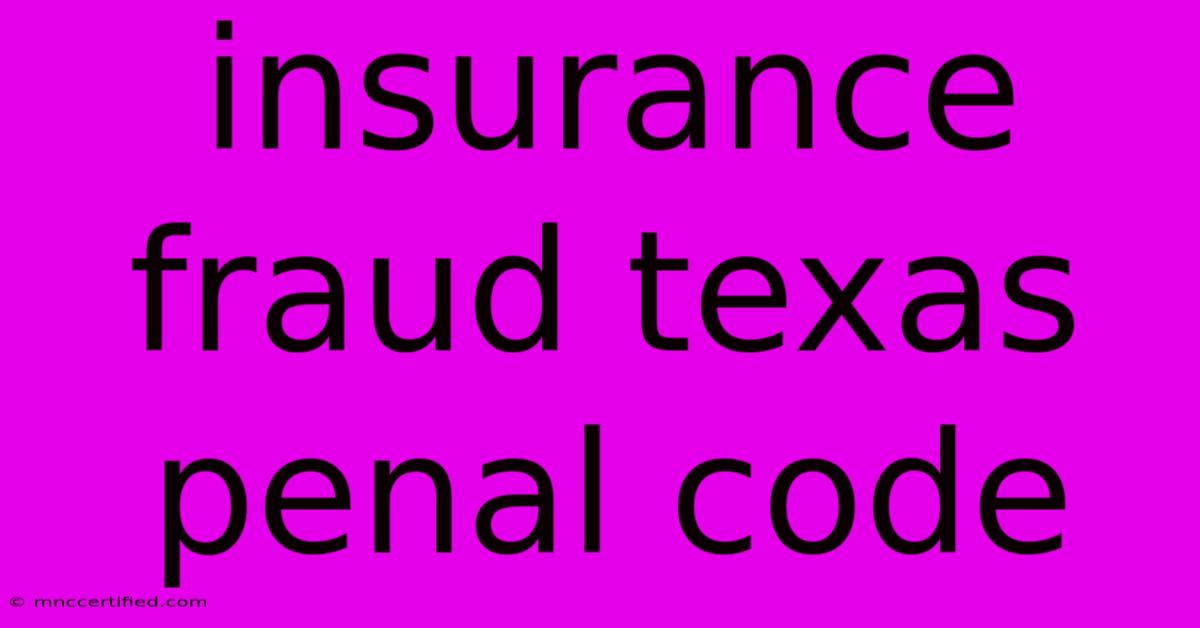Insurance Fraud Texas Penal Code

Table of Contents
Insurance Fraud in Texas: A Comprehensive Guide to the Penal Code
Insurance fraud is a serious crime in Texas, carrying severe penalties. Understanding the specifics of the Texas Penal Code regarding insurance fraud is crucial for both individuals and businesses to avoid legal repercussions and protect themselves from fraudulent activities. This comprehensive guide delves into the relevant sections of the Texas Penal Code, outlining the different types of insurance fraud, associated penalties, and what to do if you suspect fraudulent activity.
Understanding the Texas Penal Code and Insurance Fraud
The Texas Penal Code addresses insurance fraud under various sections, primarily focusing on deceptive acts intended to obtain insurance benefits fraudulently. These acts can range from minor misrepresentations to elaborate schemes involving multiple parties. The severity of the penalties depends heavily on the type of fraud committed and the amount of financial loss involved.
Key Sections of the Texas Penal Code Related to Insurance Fraud:
- Texas Penal Code § 31.03 (Insurance Fraud): This is the core statute addressing insurance fraud. It broadly defines the offense as knowingly presenting a false or misleading statement or claim for the payment of a loss or benefit under an insurance policy. This section covers a wide range of fraudulent activities.
- Texas Penal Code § 31.04 (False Report to an Insurer): This section specifically targets individuals who knowingly file false reports regarding an insurance claim, whether for personal injury, property damage, or other covered losses.
- Texas Penal Code § 31.05 (Staged Accidents): This section specifically addresses the crime of staging accidents to fraudulently obtain insurance benefits. This is a particularly serious offense with potentially harsh penalties.
- Texas Penal Code § 31.07 (Fraudulent Use of an Insurance Application): This section targets individuals who make false statements on insurance applications to obtain coverage they wouldn't otherwise qualify for.
Types of Insurance Fraud Covered Under Texas Law
Texas law encompasses a broad spectrum of insurance fraud, including but not limited to:
- Arson: Intentionally setting fire to property to collect insurance benefits. This is a particularly serious offense with significant penalties.
- False Claims: Exaggerating or fabricating details about a loss to inflate the insurance claim.
- Staged Accidents: Deliberately creating an accident to file a fraudulent insurance claim.
- Medical Fraud: Submitting false or inflated medical bills to an insurance company.
- Workers' Compensation Fraud: Filing false claims for workers' compensation benefits. This is a major concern for employers and employees alike.
Penalties for Insurance Fraud in Texas
Penalties for insurance fraud in Texas vary depending on the severity and value of the fraudulent claim. They can include:
- Fines: Substantial monetary fines, often exceeding the amount of the fraudulent claim.
- Imprisonment: Jail time ranging from several years to decades, particularly for felony offenses.
- Restitution: The convicted individual is required to repay the insurance company for the fraudulent claim.
- Criminal Record: A criminal conviction will significantly impact an individual's future opportunities.
Felony charges are common in cases involving significant financial losses. The more money involved in the fraudulent scheme, the more severe the potential consequences.
What to Do if You Suspect Insurance Fraud
If you suspect insurance fraud, reporting it is crucial. You can report suspected fraud to:
- The Texas Department of Insurance (TDI): The TDI is the primary regulatory agency for insurance in Texas and actively investigates suspected fraud.
- Law enforcement: Local police departments or the Texas Rangers can investigate criminal activity related to insurance fraud.
- Your insurance company: Report your suspicions to your insurer, who may have internal fraud investigation units.
Providing detailed information, including dates, times, names, and any supporting documentation, will strengthen the investigation.
Protecting Yourself from Insurance Fraud
Being aware of common insurance fraud schemes can help you protect yourself:
- Thoroughly review your insurance policies: Understand your coverage and reporting requirements.
- Maintain accurate records: Keep detailed records of all your assets and insurance-related documentation.
- Report suspicious activity: If you suspect fraud, don't hesitate to report it to the appropriate authorities.
- Choose reputable insurance providers: Select insurers with a strong reputation and robust fraud detection systems.
Insurance fraud is a costly crime that affects both individuals and the insurance industry. By understanding the relevant sections of the Texas Penal Code and taking proactive steps to prevent and report fraud, we can help maintain the integrity of the insurance system in Texas. Remember, if you're unsure about anything related to your insurance, consult with an attorney or insurance professional. This information is for educational purposes and is not a substitute for legal advice.

Thank you for visiting our website wich cover about Insurance Fraud Texas Penal Code. We hope the information provided has been useful to you. Feel free to contact us if you have any questions or need further assistance. See you next time and dont miss to bookmark.
Featured Posts
-
Stalker 2 Review Ign Progress Update
Nov 21, 2024
-
Georgia Long Term Care Insurance
Nov 21, 2024
-
Chad Michael Murrays Christmas Movie Workout
Nov 21, 2024
-
Cyber Insurance Questions To Ask
Nov 21, 2024
-
One Direction At Liam Paynes Funeral
Nov 21, 2024